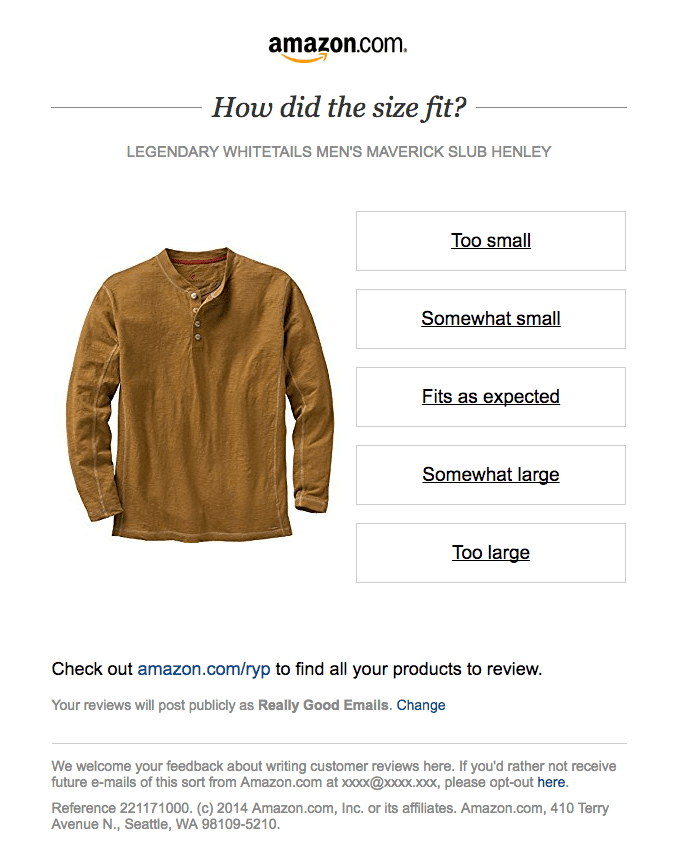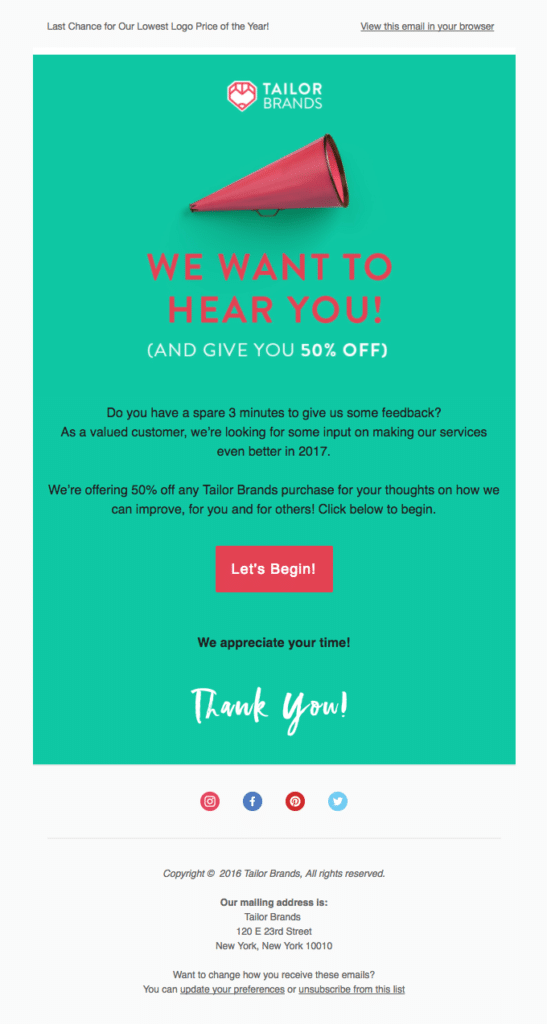Learn how to write a survey email subject line that gets your emails opened and your surveys responded to.
You’ve probably gotten a survey email before, with a subject line that reads something like:
- “Customer satisfaction survey.”
- “Your opinion matters!”
- “Let us know what you think.”
- “Feedback about your recent purchase.”
…But how many of those do you actually open?
You already know that subject lines can make or break any email campaign you send out — particularly with survey emails, which require customer responses to be successful.
According to a recent report, only 22% of marketers believed customer loyalty for brands has increased over the past two years. 38% of customers, however, consider themselves loyal to brands they love. This shows a very discouraging disconnect between marketers and the people they want to reach.
So why is this happening, and what can you do to bridge that gap? Those generic “Let us know what you think” survey email subject lines might only get the attention of your angry or frustrated customers.
Remember, the goal of an email survey is to collect honest data about a wide range of customers — happy, unhappy, and everywhere in between — and understand your customer experience from start to finish.
10 tips for creating survey email subject lines your subscribers will open
If you’re sending out survey emails with lackluster subject lines, your data will be measly (and totally inaccurate). Don’t worry, though. Here are 10 tried-and-true tips for sending survey emails with fire open rates (plus 15 example subject lines)!
1. Trigger an emotion
Imagine all the survey email subject lines in your inbox right now. What emotions come to mind?
Are you having trouble coming up with an answer? That’s probably because most of those subject lines don’t trigger any type of emotion. They’re forgettable.
Just like with your other email campaigns, you want to invoke some type of emotion in your subscribers when they see that Gmail notification. Emotion always trumps rationale. “Let us know what you think” will not produce an emotion unless the customer had an extreme experience with your company.
While extremely positive reviews are great, it can take a lot to counteract extremely bad reviews, so you want to aim for customers who had a pleasant experience but may need extra reinforcement or reward to write a review.
The easiest emotion to trigger in your survey subject lines is empathy. People tend to identify with other customers as the “us” and brands as “them.” That’s why word-of-mouth marketing is so important.
Let subscribers know that they can help their fellow comrades make informed decisions about your company or organization by replying to the survey.
2. Make sure it’s personal
“Quick customer feedback survey” doesn’t necessarily pack the punch you’re looking for. Not only is this email subject line dry and boring, but it’s also extremely robotic and impersonal. Your subscriber isn’t an inbox — they’re a human. So in your subject lines, speak to them like a person.
According to research from Accenture, 75% of customers are more likely to spend their hard-earned money with brands that recognize them by name and remember information about them. Plus, personalized survey emails are vital for understanding customer satisfaction (which = retention).
We might sound like a broken record, but it’s extremely important to use personalized subject lines.
You can also take it a step further by sending personalized automated emails. If you’re requesting feedback about a recent purchase, make sure to incorporate the day, location, order number, and any other unique information you have to help the customer recall their experience.
Uber does a great job of personalizing their automated feedback emails with a friendly tone and specific information about the purchase.
3. Pose a question
Even if you go the route of “Well, how did we do?” you’re still engaging with the subscriber instead of simply reacting to their recent purchase. A question forms the beginning of a conversation with a real human being — it’s not simply a robotic response.
Questions are excellent survey email subject line choices both for past purchases and general surveys about your brand as a whole. Time automated surveys about products to go out after the subscriber has had a chance to experience the item.

4. Mention the word “survey”
Specifically asking your customers to take a survey in the subject line is a great and clear CTA right off the bat.
However, you should still word your subject lines in an intriguing way. “Take our survey today” probably won’t deliver the results you want.
Instead, use personalization or some kind of incentive along with the word survey to boost your subject line’s potential.
5. …or don’t mention it at all
This isn’t carte blanche to completely dupe your subscribers. You can, however, entirely avoid even mentioning the survey in your subject line.
Get creative. Consider how you would start a conversation with a trusted friend you’re asking for advice, and write your copy from there.
Focus on developing a one-on-one relationship with your subscribers in your survey email subject lines.
6. Focus on the benefits
Following up with the previous point, you can avoid mentioning the survey in your subject lines by mentioning the benefit instead. To do this, however, you need to offer some kind of incentive for taking the survey.
For longer surveys, offer a bigger incentive—like 50% off a one-time purchase. This may seem like quite a large give, but remember the value of a customer’s time and feedback.
Even quick product reviews on your website could warrant a smooth 10% or 15% off.
7. Make sure your copy lives up to the survey email subject lines
If you make promises in your survey email subject lines, make sure you follow through with it in the body copy.
This point is crucial for several reasons:
- To avoid spam filters (spammy copy = bad copy, always
- To uphold your brand’s (and email service provider’s) reputation
- Getting the results you want. Dry, boring copy won’t make people want to take your survey!

8. Keep it short
Over 41% of emails were opened on mobile devices in 2021, and your subject lines need to take that into consideration. Finding the ideal subject line length is tricky, but when it comes to survey email subject lines, we’d recommend keeping them short so they fit into app notifications.
How short? You should be safe with 50 characters.
You should also keep it short so that your subject line copy is concise, straight to the point, and easy to understand.
9. Encourage some kind of urgency.
If you don’t discuss anything about time constraints, your subscribers might not respond. They’ll think about responding. They’ll have every intention to respond. But they won’t actually respond.
Expressing urgency can be as simple as using the word “now” in your subject lines. You can also let subscribers know that the coupon for taking the survey will expire at a certain time.
10. Use emojis.
A report by Experian revealed that fifty-six percent of brands using emojis in their email subject lines had a higher unique email open rate.
Emojis can be over-used in email marketing these days, but they add levity and friendliness to almost any send. In a world of bland corporate surveys with almost no pep, an emoji in your subject line can add a little spark. ✨
Remember — not all emojis render properly based on the email client. Check to see if the majority of your list uses a supported email provider before going all-in on the emoji front.
15 survey email subject line examples worth copying
Most survey email subject lines follow a simple set of formulas: they personalize, incentivize, and/or create urgency to get folks to click in and fill out the survey.
Here are a few examples to inspire your next survey subject line:
Examples using personalization
- “[NAME], people have questions about [insert product]. Can you help?”
- “Hi [NAME]. Can we talk?”
- “Hi [NAME], how do your new [brand] sneakers fit?”
- “Hey [NAME]. Time’s almost up to earn 50% off.”
Examples using second person POV
- “Your Saturday afternoon trip with Uber”
- “Well, what do you think?”
- “Your feedback makes us better”
Examples using incentives
- “Take a quick survey, earn 25% off”
- “Looking for 40% off?”
- “Penny (or more) for your thoughts?”
Examples that create a sense of urgency
- “LAST DAY to win a $200 Visa gift card”
- “Last chance! Survey ends at midnight”
Examples with emojis
- “Answer our survey, get a 🎁”
- “Got a minute? ⏰”
- “This Valentine’s Day, we ❤️ your feedback.”
Start sending those survey emails
Survey email subject lines are tough because, by nature, surveys aren’t the most interesting pieces of content. Marketers really need to use their creativity to come up with something unique that will spark interest.
We could write an entire blog post on survey email copy but you need to actually get subscribers to open the email first. Otherwise, you’ve just wasted your time creating something amazing that no one will ever read.
Focusing on your subscribers’ wants, needs, and state of mind can help you develop subject lines that hit home. Just don’t forget to A/B test a few different subject lines!
Need help creating rock-solid subject lines or embedding beautiful surveys directly into your emails? Campaign Monitor can help with customizable templates.






